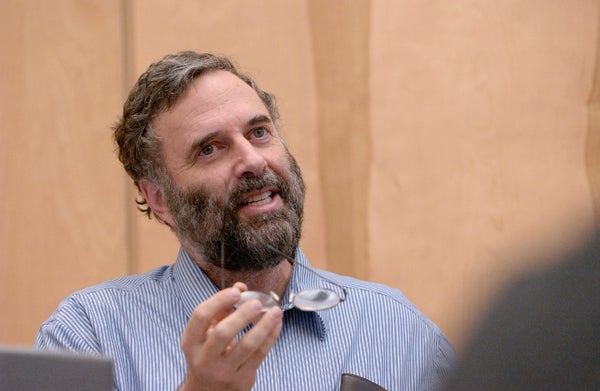|
September 1, 2011
Statewide initiatives may result from Stanford-led 'deliberative polling'
One weekend in June, a scientifically representative sample of California voters gathered in Torrance for the first-ever statewide "deliberative poll." Spearheaded by Stanford communication Professor James Fishkin, the gathering aimed to educate and facilitate discussion among participants, who were polled on their opinions toward a variety of statewide reforms. By Stephanie Liou

"Ordinary people are very smart collectively, if you give them a chance to grapple with the issues," says Stanford Professor James Fishkin, the director of the Center for Deliberative Democracy. (Photo: Linda A. Cicero / Stanford News Service) To drive a car in the United States, you must pass a test and acquire a license. Before you can mortgage a house or obtain a credit card, a detailed contract must be read and signed, indicating that you understand the terms of the agreement.
But any registered voter is eligible to cast a ballot, even if his or her opinion is based just on campaign slogans and pithy sound bites. Similarly, telephone polls used to gauge public opinion about policy reforms do not gauge respondent knowledge or understanding.
And to Stanford communication Professor James Fishkin, the director of the Center for Deliberative Democracy, that just doesn't make sense. This belief led to the idea of "deliberative polling" – bringing together a group of voters, helping them learn about the issues in a nonpartisan way and then asking for their opinions.
"It turns out ordinary people are very smart collectively, if you give them a chance to grapple with the issues," said Fishkin.
Fishkin polls his group members before and after their discussions, and has found that they often change their minds as a result.
Turning knowledge into power
After conducting deliberative polls in more than 18 countries and seeing participants' viewpoints change on about 70 percent of issues, Fishkin embarked upon his most ambitious experiment yet, the What's Next California project.
With the support of the Bill Lane Center for the American West, PBS, the Davenport Institute at Pepperdine University and numerous other California public interest and policy groups, Fishkin ran a large-scale deliberative poll this June in Torrance with the goal of having the participants support initiatives that could appear on the ballot in the statewide elections this November.
"This is the first time ever that a scientific random sample of a population has set the agenda for a variety of possible votes by the entire population," said Fishkin. "Unless you count the Athenian Council of 500, chosen by lottery 2,400 years ago."
To ensure that his sample was representative of the California population as a whole, Fishkin's team selected participants from all races, religions, geographical regions, political leanings, income levels and other criteria, and made sure their numbers were proportional to the entire state's population ratios. These people were then invited to participate in a weekend deliberative polling session for a compensation of $300. A separate control group, made up of demographically comparable citizens, was polled by phone but not invited to the deliberative sessions.
Is that your final answer?
During the three-day session, participants were given lengthy briefing documents on 30 different proposals in four areas: the structure of the legislature, the initiative process, state-local reform and taxes. In addition to various small-group discussions and plenary sessions, a variety of experts representing opposite opinions or political ideologies spoke about the proposals and were also available to answer questions.
Before-and-after polling results were compared, and Fishkin described some of the findings as "earthquakes in public opinion" because of the dramatic shifts after deliberation.
Notably, an initiative to have legislators work on a part-time basis has polled well in surveys conducted by the Los Angeles Times, and nearly half of the weekend participants initially supported this proposal. However, post-deliberation results showed a drop in support of 18 points, from 45% to only 27%. The deliberative poll also showed that most citizens support having more legislators with longer terms, to decrease the number of people represented by each legislator and to give legislators more time to learn about the issues and push for changes that are important to their constituency.
After the deliberative poll, citizens also showed greater interest in increasing the authority of local governments and, surprisingly, a motion supporting "reassessing non-residential property more frequently than now" gained 20 points, from 52% to 72%. Most proposals to raise taxes were still seen unfavorably, possibly due in part to participants' opinions of government waste – they believed the government is wasting a whopping 39 cents on the dollar.
"If you have one vote in millions, you don't think your voice matters, so you don't pay attention," Fishkin. But after this deliberative poll, participants felt more engaged in local issues. Eighty-nine percent rated the process "extremely valuable," and 88% agreed that "I learned a lot about people very different from me – about what they and their lives are like." Overall correct answers to eight knowledge questions increased significantly by 18 points when compared with testing results prior to the weekend, demonstrating that the process had helped to educate participants about various public policy topics.
Where does this lead?
Fishkin has high hopes that the results of this groundbreaking deliberative poll will find their way onto the ballot for November's elections via the initiative process, with support from civic organizations. He has high hopes, for example, for initiatives to restructure state and local government.
A documentary soon to be aired on PBS provides a detailed look at the process, and Fishkin already has received emails from other states seeking information.
Although the cost of the weekend was $1.5 million, Fishkin believes that it offers valuable improvements to the democratic process. "This lets the people take ownership of the agenda-setting process," he said. "Getting some of these reforms on the ballot [is one] route to responsible advocacy."
Stephanie Liou is an intern at the Stanford News Service.
-30-
|